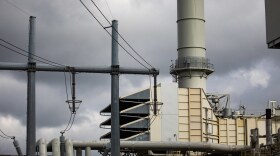State lawmakers on Thursday will discuss changing Texas' electricity market to increase grid reliability. The Senate Committee on Business and Commerce meeting is another step in the process to overhaul the power grid after the tragic blackout of 2021.
But critics say the centerpiece of the proposed changes may not help Texas avoid future blackouts and the analysis used to support it is deeply flawed.
It is also really confusing.
The proposal is called a “performance credit mechanism.” It's described in a report commissioned by the Public Utility Commission of Texas as a way of incentivizing more predictable, easily dispatchable electricity to be produced for the grid.
“This is a remarkable milestone for [the Electric Reliability Council of Texas], the market and also for the state of Texas,” said PUC Chair Peter Lake when unveiling the report. The Electric Reliability Council of Texas, or ERCOT, is the state's electric grid operator.
“At the most fundamental level, the performance credit mechanism requires, in my mind, anyone who sells power to a household or business in ERCOT to guarantee that they are buying that power from a reliable source.”
The idea is to award “credits” to power generators that are able to supply electricity to the grid during “high-risk” hours when the operating reserves of electricity on the grid are at their lowest.
After those “high-risk” hours are identified, utilities and electric retailers that consumed power at those times are required to also buy the performance credits from the power generators.
In this way, the proposal argues, the credits will become a financial mechanism to encourage the construction of more reliable power generation.
But some disagree.
“This is really hard to wrap your head around. It will be even harder to administer," said Alison Silverstein, a former state and federal utility regulator who has consulted on alternate proposals to improve the Texas grid.
“If I were an investor trying to finance a new power plant, I don't see how there's anything in this proposal that would give me a predictable revenue stream I can take to the bank,” she said.
Silverstein and others also worry about the methodology that went into creating the proposal.
Specifically, they point out that the 2021 winter storm (dubbed "Uri") that led to the big Texas blackout was not included in weather modeling that produced the recommendations.
“Further analysis would be needed ... to develop a corresponding reliability standard [to that winter storm]. Such analysis is beyond the scope of this study,” the report says.
"It’s remarkable to me that they did not run a Uri-like scenario and see how these different (market) structures would would hold up” says Doug Lewin, head of the consulting firm Stoic Energy. “I think it stands to reason that had they put Uri into this, you would have had much higher costs, particularly for the performance credit mechanism.”
As things currently stand, the report estimates that the performance credit mechanism could increase electricity costs on the Texas grid by $460 million a year. Proponents of the credits say electric companies may eat some of that cost and not pass it on to consumers. Others point out that everyday ratepayers always end up, eventually, footing the bill.
Both Lewin and Silverstein advocate for alternate fixes for the state grid, including improved energy efficiency standards. They argue some of the proposals outlined in the report commissioned by the PUC could needlessly block the development of renewable power generators with little impact on grid reliability.
Specifically, Lewin points to a portion of the report on page 74 that says some members of the Public Utility Commission want to exclude wind and solar power generators from receiving reliability credits.
“The problem that I think some of these folks [at the PUC] are trying to solve is, ‘How do we disadvantage renewables?’” Lewin said. “They're trying to solve the wrong problem.”



















